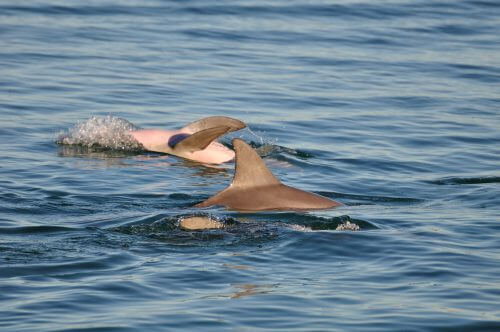Research carried out by an international team of researchers from the Universities of Bristol, Zurich and Western Australia provides further insight into the social habits of these amazing animals.

When it comes to making friends, dolphins seem to form close friendships with other dolphins who share the same interests as us. The findings, published in the journal Proceedings of the Royal Society B by an international team of researchers from the Universities of Bristol, Zurich and Western Australia, provide further insight into the social habits of these amazing animals.
Shark Bay, a World Heritage Site in Western Australia, is home to an iconic population of dolphins from the Indian and Pacific Oceans, and the only place where dolphins have been observed feeding on marine sponges. This technique, passed down from generation to generation, helps certain dolphins, called spongers, to find food in deep channels. While the technique of using tools has been well studied in female dolphins, the current study was mainly concerned with male dolphins.
The researchers used genetic, behavioral and photographic information collected from 124 dolphins during the winter months in Shark Bay over nine years (2007 to 2015). The team followed a subset of 37 male species of which 13 were spongy and 24 did not use a sponge as a eating utensil. It turned out that impregnated males spent more time with other impregnated males than with non-embedded ones. These relationships were based on similar food technology and no relationship was found with other features of the dolphins.
Dr. Simon Allen, co-author of the study and senior researcher at the School of Biological Sciences of the University of Bristol, explains: "Eating with a sponge is something that takes time and has so far been considered an action that is done alone, so it does not suit the needs of the male dolphins in Shark Bay - to invest time in forming close alliances with other males. This study suggests that, like female dolphins, and also like humans, the social bonds of male dolphins are based on shared interests.
The study provides new insights into homophilic behavior (the tendency to bond with animals similar to you) in the social network of tool-using dolphins.
Manuela Bitzzerro, lead author of the study at the University of Zurich adds: "Male dolphins in Shark Bay showed a fascinating social system of forming alliances. These strong bonds between males can last for decades and are critical to the mating success of each male. We were very excited to discover the alliances of the spongers, as they form close friendships with others with similar preferences."
More of the topic in Hayadan:

3 תגובות
Another point: it is possible that the previous social connections create the common areas. We would say that a dolphin tells a friend dolphin about the use of the sponge and does not tell a dolphin who is not his friend, and so it turns out that friend dolphins have similar domains.
A. Lack of detail on the question of how much longer. Not a few minutes but many hours every day.
B. The conclusion of the study is self-evident. The sponge-using dolphins meet each other at the sponge mining sites and form bonds there. They also have to learn from each other how to use the sponge and that also brings bonding.
third. It is strange to me that just to reach this esoteric conclusion three research teams worked for 9 years
There is a great lack of explanation for the strange phrase "they feed on marine sponges". As far as I know, the sponge is used to protect the bow when probing the ground, which without the padding would have injured the dolphins.